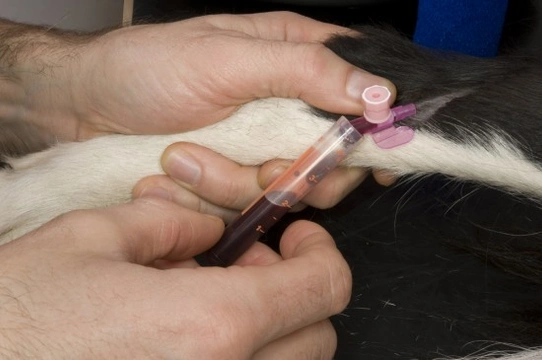
Blood transfusions for cats and dogs - Could your pet be a lifesaver?
Occasionally in veterinary practices, a seriously sick or injured cat or dog will need a blood transfusion in order to help with their treatment and potentially save their lives. Blood transfusions for pets is still a relatively new concept within the UK, although over the last few years the viability of sourcing the blood needed to treat many different dogs and cats has meant that performing blood transfusions for pets when needed has been on the increase.What exactly does a blood transfusion involve, where does the blood come from, and how does it all work? Read on to find out more!
What is a blood transfusion?
A blood transfusion involves replacing blood that the body has lost, or supplementing blood that is unhealthy or missing some of its core components, with blood from a donor animal. Blood is taken from a donor animal by means of an IV line and safely stored refrigerated as either whole blood, plasma, or other component parts of the blood. Clinically drawn and correctly stored blood can be kept for up to six weeks, which is why there is a constant need for donors and sometimes, a shortage of available blood for pets in need. Transfusions are occasionally performed on site as needed, drawing blood from a donor dog or cat specifically to treat another animal that needs the blood.
Pets and blood groups
Just like people, animals have separate blood groups, and matching the right blood group between the donor animal and the pet that needs blood is of course essential. There are thirteen different blood types in dogs, and eight blood groups that are commonly seen. Between a third and half of the canine population are considered to be ‘universal recipients,’ meaning that they can generally accept blood from any blood group.In cats, there are three blood types, and again, the correct match must be established before a transfusion can take place.
Why might a pet need as blood transfusion?
There are a wide range of possible reasons for why a pet might need a blood transfusion, ranging from a life-threatening loss of blood due to an injury, right through to illnesses and conditions that cause a deficit in some of the cells and component parts of the blood, such as anaemia or leukaemia.
Where does the donated blood come from?
All of the blood used for canine and feline transfusions is donated from other animals. Pet owners are encouraged to consider registering their cat or dog as a blood donor if they are healthy, vaccinated, and of a generally calm disposition that would ensure they do not find the process overly traumatic. Donor pets may be asked to give blood on a semi regular basis, such as once or twice a year, or be placed on an emergency matching register as being available to give blood in the case of an emergency.Some larger veterinary chains such as MediVet run their own blood bank services; MediVet works with a range of pet rehoming centres to identify suitable donor pets, and takes a blood donation from them as a one-off in return for funding their vaccinations and other aspects of their care.
How do vets and owners find the blood that their pets need?
All veterinary practices are affiliated with at least one pet blood bank or database, to enable them to source the correct blood that they need for the pet that needs it quickly. Some larger practices and emergency care clinics keep blood in-house, ready to be used in an emergency. Larger chains of practices also sometimes keep a database of donor pets in their area that can be called upon to donate to a pet in need in the case of an emergency. This is sometimes the preferred method of operating, as drawn blood only has a finite shelf life, and the time and financial costs of drawing and storing blood that then has to be disposed of can be significant.
Could your pet become a lifesaver?
Would you be able to consider making your pet available as a blood donor? Dog and cat blood donors are always needed, and your pet could help to save the life of another animal. Owners are not normally paid for their pet’s contribution to the blood bank, but reasonable travelling expenses and out-of-pocket costs will generally be covered.In order for a dog to be considered as a blood donor, they must:
- Be good tempered and calm
- Have lived their whole lives in the UK without going abroad
- Be under 25kg in weight
- Be aged between one and eight years old
- Be healthy, in good condition and not on any medications
- Be fully vaccinated
For a cat to be considered as a potential donor, they must be:
- Aged between one and five years old, or one and eight years old in some circumstances
- Over 4kg in weight, but not overweight
- Calm and relaxed in unusual situations, such as visiting the vets
- Fully vaccinated
- Completely healthy and not on any medications
- Indoor-only cats are preferred, although this is not a firm rule
Further information
If you would like to find out more about pet blood transfusions, how you can help, or if your pet might make a good donor, check out these links:Pet Blood Bank UKCat Blood Donors



